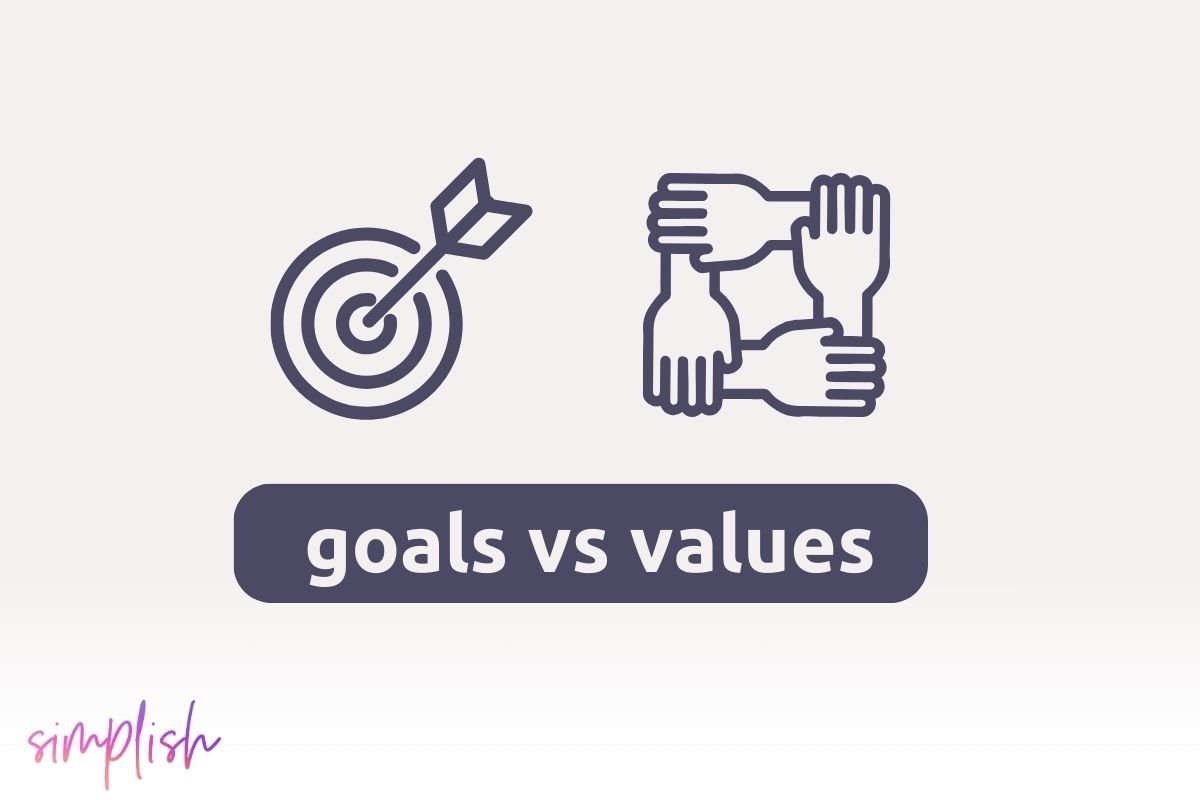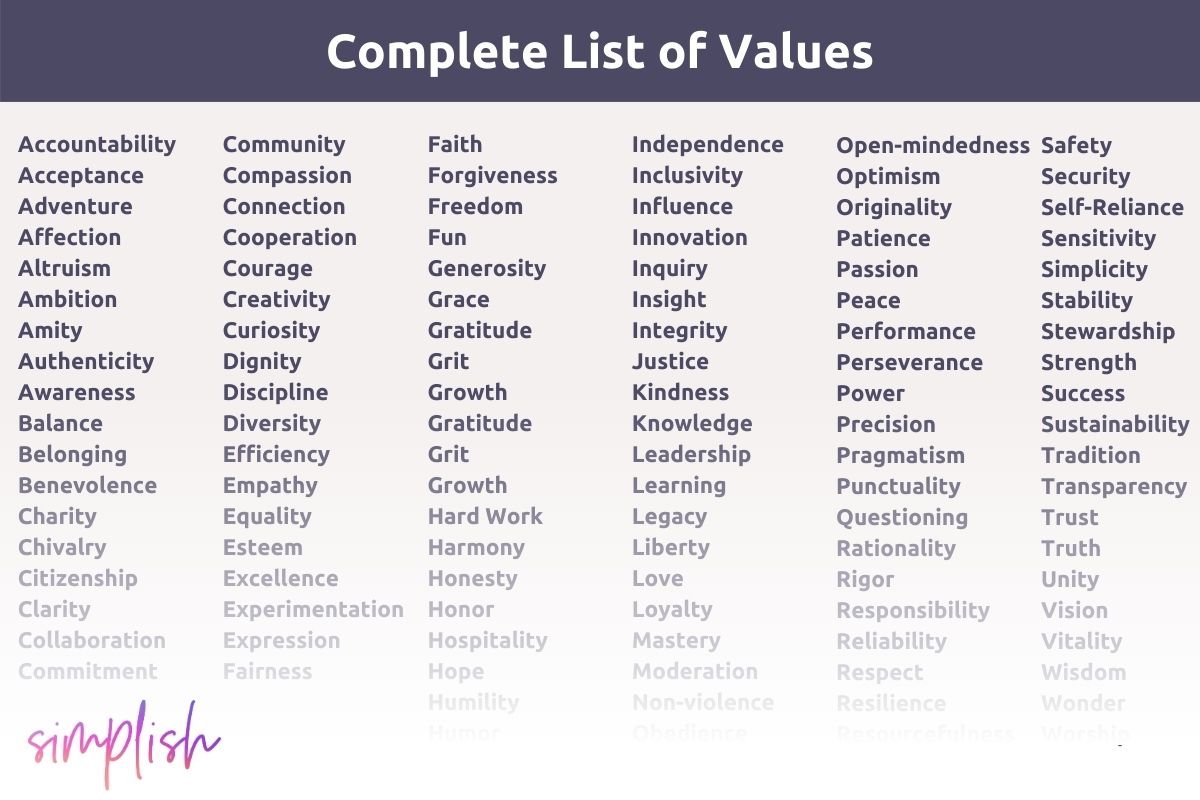The Difference Between Values vs. Goals (and Why It Matters)
Question for busy people: Are you hustling to accomplish goals, or are you hustling to align with your values? Or maybe, both are driving you?
(Long moment to consider the motivations driving your approach to life...)
There's no right or wrong here. It all simply comes down to knowing the difference between goals and values.
If you're on the path of personal growth, you may discover that your goals have less importance in and of themselves than you originally thought (e.g. hustling for the sake of hustling). Instead, you might discover more insight into yourself by reflecting on the "why" behind your goals that values hold (e.g. commitment, community, or discipline, for example).
So what's the difference between values and goals? That's exactly what this article is all about.
While the traditional understanding of getting things done is goal-oriented, it's important to consider that feeling great about what you've done is essentially a matter of values. In this article, explore why understanding the difference between values and goals matters, and how to ensure that your goals are aligned with your values to boost productivity - and feel great about what you've done.
The Difference Between Values vs. Goals (and Why It Matters)
While goals are specific outcomes we aim to achieve, values are ongoing, guiding principles that influence our behavior and decision-making process.
What Are Values?
When you consider whether you're satisfied with where your life is going and what you need for personal fulfillment, you're reflecting on values. A few examples of values include:
Freedom
Loyalty
Security
Thinking of what's most important to you? Check out the full list of core values and the Simplish guide to defining your own values for step-by-step instructions on how to put words to what's most important to you.
Values are the core principles and beliefs that guide your decisions. They represent what is most important to you in life and provide a sense of meaning and direction. Personal values are not about achieving something; rather, they set the ground rules for the qualities you want to embody in your daily life. Values help you to hold yourself accountable for your actions, set the terms of your relationships, and set priorities according to importance. Understanding what your values are can help you to identify when it may be time to let go of goals that aren't fulfilling, and focus instead on setting goals aligned with what truly matters to you.
You Might Also Like: 5 Tips For Aligning Intent And Impact Through Self-Awareness
Some objectives, like financial security, can be a goal for some people, and a core value for others. If you value experimentation, for example, you may need to establish a basic level of financial security to enable trying different things. Someone else may have a deep need for stability, and therefore considers financial security as a core value. Values are:
Enduring: Values are long-lasting and remain constant over time, providing a stable foundation for your life, relationships, and sense of order.
Meaningful: Values serve as a compass, guiding your understanding of meaningful action. When you're unsure of what to do, your values provide a way of approaching your decision.
Intrinsic: Values fuel intrinsic motivation for behavior, attitude, and action that does not depend completely on external circumstances, for example losing weight.
What Are Goals?
When you focus on getting things done on a daily basis, you're probably focusing on achieving goals. A few examples of goals include:
Earning a certain income
Traveling abroad
Working out three times a week
...and the list goes on.
Goals are specific, achievable, and time-bound outcomes that you strive to accomplish. You can think of them as the steps you take to live your values. Setting goals helps you to focus your effort on specific objectives that work together toward your vision for the future you want to live. Goals are:
Specific: Goals are clearly defined and specific, making it easier to focus efforts and measure progress.
Achievable: Goals are oriented towards achieving specific outcomes, providing a sense of accomplishment when met.
Time-Bound: Goals have deadlines, which create a sense of urgency and motivation to complete them
Red Flags That Goals Have Taken Over
The productivity world is dominated by goal-oriented tools and techniques designed to help you achieve your aims efficiently. But what if you're setting the wrong goals? A purely goal-oriented approach to productivity will inevitably lead you to burnout, resentment toward everyone around you, or just losing touch with what makes life worth living.
While goals are essential for making progress toward outcomes, focusing excessively on outcomes can distract you from why you're doing what you're doing; in other words, what you value.
Here are a few red flags that signal your goals are hi-jacking your life, and it's time to shift your attention living a life of purpose rather than pursuit:
Compulsive busy-ness: Blindly pursuing goals that don’t align with your values can lead to fixation on hyperactivity. The thinking may go, if you can't get what you really want, at least you can achieve busyness!
Consistently setting unrealistic goals: Nothing damages your self-confidence like setting goals that you can't actually achieve. If setting unrealistic goals and failing to achieve them becomes a habit for you, it might be a sign that you need to reflect on your expectations and values (and possibly work on setting better goals, as well)
Overemphasis on achievement: Some people are naturally driven to achieve, and there's nothing wrong with that. But constantly striving for the next goal can prevent you from appreciating the present moment and the progress you have made.
Neglecting your wellbeing: If achieving your goals is competing with self-care in your calendar, this is warning sign that external achievement is out of balance with your personal needs. Learning to set healthy boundaries with your time, at work, and in relationships, along with reflecting on your values, can help you spend needed time to nourish yourself.
Reflection Prompts for Refocusing on Values
For personal growth, it’s important to regularly reflect on what truly matters to you, whether your actions honor these priorities, and when change may be needed. Pull out your journal and get started with the Simplish guide to defining your values with the help of the full core values list.
Then, use the reflection prompts below to go deeper into how your goals and values exist in your life:
Do your current goals reflect what is most important to you in life?
Which value or values do you feel are most in conflict with your goals?
Are you satisfied with how you set and work towards your goals?
How can you adjust your goals (or goal-setting process) to better align with your core values?
What small actions can you take daily to honor your values?


